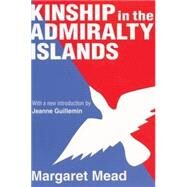Kinship in the Admiralty Islands
, by Mead,Margaret- ISBN: 9780765807649 | 0765807645
- Cover: Nonspecific Binding
- Copyright: 9/30/2001
The Manus of New Guinea's Pere village were Margaret Mead's most favored community, the people to whom she returned five times before she died in 1978. Kinship in the Admiralty Islands is the classic and only thorough description of their complex rules of marriage and family relations. It draws on Mead's 1928-1929 field work, conducted with her second husband, New Zealander Reo Fortune, and benefits by her being able to cross-check her data with his. Written in 1931, Kinship followed Mead's first and very popular book on the Manus, Growing Up in New Guinea, which was criticized by other anthropologists for being too general in scope. In Kinship Mead succeeded in demonstrating her thorough knowledge of this Melanesian group in the specific terms prized by her scholarly colleagues, while also describing in depth Manus social structure.Kinship in the Admiralty Islands describes an intricate system of social restraints and kinship ties and their impact on the local economy. The Manus' predilectionfor adoption, for example, allows surrogate fathers to make extended marriage payments, while in the next generation their adopted sons will take on the same responsibility for other young men in the new kin network. Mead reviews other kinship rules, such as avoidance behavior between in-laws of the opposite sex, early betrothals, other forms of adoption, and a range of deference behavior and joking relations among kin. In this work, Mead walks a fine line between functionalist kinship analysis of the British school of Radclife Brown and the cultural-and-personality orientation of Americans in the school of Franz Boas.






